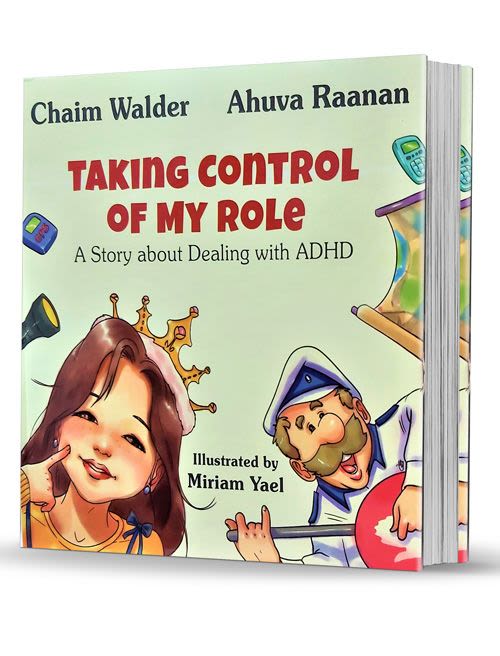
Judge Yourself Fairly
You wouldn't agree to have your fellow man tortured in a kangaroo court, so why do it to yourself? Why remind yourself repeatedly of old mistakes?

We are now in the middle of Lesson Four: To judge yourself fairly. This requires giving yourself a fair trial by differentiating between faults which are out of your control and faults that are within your control. The yield of this work is inner peace, overcoming guilt complexes and uprooting the anger you harbor at yourself. We continue now with a clear example:
* * *
Let's see how [to do this], with the following case study:
The Unlikely Inmate
Dave Cummings, a successful investment broker, washed and dressed in eight minutes, while his wife prepared coffee and sandwiches for him. He grabbed his attaché case, the keys to the car, and the paper bag with the sandwiches. In another minute, he was out the front door. "Talk to you later, Patsy," he called over his shoulder. "I'm flying."
"Drive carefully, Dave," Patsy waved, "it's rush hour."
Dave zigzagged through the inner city streets on the way to his downtown office.
That same morning, on the way to school, two rival junior high school gangs challenged each other to a game of "chicken," to be played on Main Street in front of a bevy of squealing goggle-eyed female classmates. Each player had to dart across the street as close as possible to an oncoming car. A pair of thuggish referees crowns the more daring side as the winners, and condemns the losing side as "chickens."
Dave was contemplating his prospective fee from an eight-figure investment deal. Up ahead, the light was green. Time was running short. His foot pressed the accelerator a little harder. The odometer's needle reached the fifty miles per hour mark; the inner city speed limit was twenty-five miles per hour.
* * *
J.T., the captain of the Sharks had just made a blood-chilling dash across the street, causing the driver of an approaching pickup truck to slam on his brakes. Four screeching tires filled the street with the stench of burning rubber. The kids on the curb whooped victory cries. The burly driver stuck his head out of the window, shook a fist at the gang, and roared, "You crazy kids are gonna get yourselves killed! If I weren't in a rush, I'd beat the daylights out of you!"
"Yeah, yeah, big shot!" chided the Sharks as the pickup drove away.
All eyes turned to Richie, captain of the rival Avengers. "Surrender, chicken!" yelled J.T., "no way you'll top me!"
The pickup missed J.T. by twelve inches, a tough act to follow. "Get outa my face", snarled Richie. "My grandma's got more guts than your yella butt."
A blue Buick was speeding down the street, faster than all the other previous cars. "Watch this, you chicken Sharks!"
Like a rocket, Richie flew off the curb at the very last instant. He misjudged the speed of the oncoming Buick, and its startled driver – Dave Cummings – slammed on the brakes a split second too late. The car rammed into the boy's left hip, catapulting him a good thirty feet before crushing him under its skidding wheels. The Avenger gang captain became a lifeless nightmare of blood and broken bones in the middle of Main Street.
* * *
The prosecution was shooting for convictions on three offenses – speeding, reckless driving, and involuntary manslaughter. Dave Cummings, who never committed the slightest misdemeanor in his entire thirty-six years, faced the threat of a possible eight-year prison sentence!
Dave's attorney took advantage of the court’s overcrowded docket to plea bargain with the prosecution. The speeding charge was indisputable. He could probably beat the reckless driving charge with a good defense. As for the third charge – manslaughter – the prosecution wanted Cummings’ blood.
The defense counsel turned to the judge, and said, "Your Honor, that gang leader literally threw himself under the tires of my client's car. If the esteemed prosecution is concerned with public safety on our streets, why hasn't he sent the members of those two street gangs to juvenile court? They could have turned any one of us into a murderer!"
"What do you propose, counselor?" asked the judge.
"I won't deny the charge of fifty miles per hour in a twenty-five miles per hour zone. The manslaughter charge is out of the question. As far as reckless driving…"
"Your honor, a fourteen year-old boy has been killed. Cummings was soaring down Main Street. He must go to prison," the prosecutor interjected.
"Slow down, the both of you!" said the judge. "I'll suggest a compromise, and we'll close the case. Mr. Prosecutor, I'll grant you a conviction and a prison sentence. Defense Counselor, I suggest that you consent to the speeding violation and a charge of fatal negligence. I realize your client's remorse, but the court can't ignore the speeding and the boy's death. A six month sentence is as lenient as I can be…"
* * *
A dark cloud of guilt weighed heavy on Dave's conscience; in prison, he fell into a deep melancholy. The horrid memory of the bloody accident played repeatedly in his head. His sleepless nights and untouched meals left him ashen-faced, with bloodshot eyes and deep wrinkles on his forehead. Almost overnight, he looked thirty years older. Worse still, his already slim frame was thirty pounds lighter.
* * *
Dave Cummings was one of the worst scarecrows of self-berating lethargy I'd ever seen, and a hard nut to crack. He had no sense of the Creator, nor did he want to hear about faith and spirituality. He only believed in what he could tangibly grasp – investments, stocks, bonds, money, and more money.
Thirty minutes into our first session, I had made zero progress. Cummings sat with his face in his hands, a stubborn bundle of guilt, misery, and self-pity. I had to throw a grenade-level comment to get his attention. "No wonder you don't eat and sleep," I said. "If I were in your shoes, I'd be dead already."
"What do you mean?"
Good! He responded to me for the first time. I decided to spin his head with a few questions that would take his brain out of the lethargy mode and stimulate some fresh thinking.
"What are you doing in this world, Dave? Why were you in such a hurry that particular morning? Why were you caught in a situation where you had to take the car to work on the exact morning that two gangs were playing chicken? How is it that you happened to drive down Main Street at the exact moment when that crazy kid decided to throw himself in front of a car?"
Dave asked for a glass of water.
"C'mon," I prodded, "investment brokers are aces in math. What's the statistical probability of you colliding with that boy, one in a trillion? One in a zillion?"
"I don't follow you, chaplain."
Terrific! He addressed me personally. Now we'll break through some ice. "My friends call me Lazer."
Dave's dreary bloodshot eyes widened. Is he opening up to me? Have I breeched the wall of his internal prison? This was the real issue: He was sentenced to six months in the penitentiary, but his soul was imprisoned for life. "Okay, L-Lazer," he said hesitantly, "Help me understand."
I convinced him that he was the furthest thing in the world from a murderer. We both know that the gang leader's recklessness was 99% suicide.
"You're miserable, Dave, because you hold yourself guilty for the boy's death. If that were true, you'd have been sentenced for a minimum of ten years on the charge of willful manslaughter. You're angry at yourself. Worse than that, you're tormenting your body and soul. Your personal penal system is much harsher than the prison. You are not guilty. The Creator used your free choices to put you in a situation where you overslept, took the car to work, and cut through inner city streets to arrive at that corner at the exact instant when some juvenile kamikaze decides to play chicken."
"You mean it wasn't fate, Lazer? Why would the Creator – if there is such a thing – set me up like that?"
"No such thing as fate, my friend. Who makes your heart beat? Who pumps your lungs? Why are you and I having this discussion? Fate? Certainly not!" I let the point sink in, and poured him another glass of water.
I managed one last sentence before one of the guards unlocked the door to our tiny meeting cubicle and informed us that our session time for the day had expired. "If the Creator hadn't concocted a scheme of throwing you in jail, you'd have gone through your entire life neglecting your soul." I left Cummings to ponder that thought overnight.
Cummings was much more receptive the second day. We talked about the Creator, about the human soul, and about spiritual awareness. Dave's eyes were beginning to light up. In our next few sessions, I taught Dave the following four guidelines:
The Four Guidelines of Judging Yourself Fairly
1. Never look back. Never say, "Why was I so stupid?" or "too bad I didn't act differently". Such expressions are the destructive advice of your evil inclination, which wants to keep you depressed, suppressed, and far away from God. At the time, you did the best you could under the circumstances. Fretting about the past is self-destructive, especially since you have no control over the past. Therefore:
2. Stop torturing yourself. You wouldn't agree to have your fellow man tortured in a kangaroo court, so why do it to yourself? Why remind yourself repeatedly of old mistakes? Correct them once and for all by asking forgiveness from God or from your fellow man, whichever the case applies, and then move forward!
3. Be constructive. Realize that you're human, and humans sometime err. A mistake is an opportunity for personal growth, when you learn from the past and subsequently implement life's lessons. Constitutional law prohibits double jeopardy, so why destroy yourself with multiple trials for the same crime? Make your constructive conclusions, and move forward with your life.
4. No Guilt! No one has the right to remind you of old mistakes, or to lay a guilty conscience on you. Evidence from such people is inadmissible in your mental court. Once a person has apologized for hurting his fellow man, or asked forgiveness for transgressing against God – or as in Dave's case, once a person has served his time in prison – the case is closed. Don't ever reopen it!
When Dave was released on good behavior seven weeks before his six-month sentence was terminated, he took Patsy on a wonderful week-long second honeymoon. Happiness, spiritual awareness, and inner peace are phenomenal fertility agents; less than a year later, Patsy gave birth to their first child. A vast number of today's proud parents were childless before they began their own journeys up the trail to tranquility. Dave and Patsy were amongst them. Fortunately, the accident gave them a new start and they were able to become a family, not just a pair of young, upwardly mobile professionals sharing expenses at the same address.
Remember! Your life, well-being, and emotional stability depend on the ability of judging yourself fairly.
To be continued…
(The Trail to Tranquility is available in the Breslev Store.)













Tell us what you think!
Thank you for your comment!
It will be published after approval by the Editor.